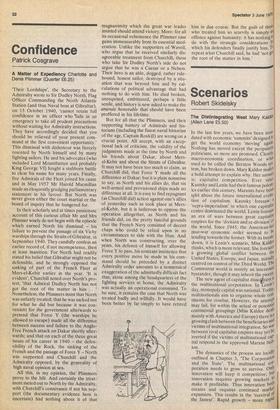Scenarios
Robert Sladelsky
The Distintegrating West Mary KaldOr ,(Allen Lane £5.50) In the last few years, we have been intlir dated with economic 'summits' designed t° get the world economy 'moving' agaitt' Nothing has moved except the peripatetic politicians, so more are promised. ClearlY. macro-economic coordination, or whet used to be called the Bretton Woods sys' tern, has broken down. Mary Kaldor make a bold attempt to explain why. Her answer is: capitalist competition. Ever sine Kautsky and Lenin had their famous pole' ics earlier this century, Marxists have bee° split about the future internaiional evokr tion of capitalism. Kautsky foresaw a 'supra-imperialism' in which one capitalist centre dominated the world. Lenin fores0 an era of wars between great capitalist, empires for the 'division and re-division. °,1 the world. Since 1945, the American-10 post-war economic order seemed to be tending towards the former. With its break down, it is Lenin's scenario, Miss Kaldot thinks, which is more relevant. She foresees a growing global conflict between tbe United States, Europe, and Japan, initiallY centred on control of the Third World. ThAe Communist world is merely an interest bystander, though it may inherit the pieces. The new agent of capitalist dissoyltion i5 the multinational corporation. In Tenio's day, monopoly capital was national. TodaY, multinationals aim to organise whole eon: tinents for combat. However, the attemP: may fail, for within the actual or potential continental groupings (Miss Kaldor deals mainly with America and Europe) there isAa growing clash between the beneficiaries LIP victims of multinational integration. So war between rival capitalist empires may yet ka iierted if the victims of multinational cal/. ital respond in the approved Marxist fash. ion. The dynamics of the process are luciellY outlined in Chapter 3, 'The Corporatioa and the State'. The multinational Of, poration needs to grow to survive. Om innovation will keep it competitive; bitt innovation requires growing markets t° make it profitable. Thus innovation both, creates and requires continued matte; expansion. This results in the 'survival °A' the fastest'. Rapid growth — more rapt'
than the total market becomes the condition for survival. Industry is constantly being concentrated into the most efficient units and most profitable areas.
This is where 'uneven growth' comes in. Multinational expansion, Miss Kaldor argues, can bring ruin to whole regions and nations. This is a new phenomenon. In the nineteenth century capital exports diffused Production and jobs. They created markets for the goods of the capital-exporting countries; they built up infrastructure in the countries receiving the capital. Today, the export of capital promotes not the export of goods, but the export of jobs. Foreign investment means the direct transfer of Production abroad through subsidiaries. Regions which att-ict foreign investment attract production and jobs at the immediate expense of those doing the investing. This process becomes cumulative; it is the new multinational organisation of economic life, beyond the control of governments, which makes it possible.
Thus the multinational corporation's need to grow and its ability to do so by Concentrating production in the most profitable areas sets up a pattern of uneven development which has profoundly unsettled international relations. American Multinational capital created `Lotharingia', the fast-growing belt of Western Europe, comprising West Germany, the Benelux countries, north-east France, and northern Italy, whose dynamism now threatens both the United States and peripheral European areas like Great Britaih with economic decadence. Miss Ka!dor sees no prospect of a 'reintegration' of the West except on the basis of a repressive American empire, rationalised by the Cold War. The more likely alternative is global competition between a nationalistic United States and a Euro
pean super-state, dominated by Ger many, which represses its own declining regions.
Such is Miss Kaldor's argument. Like all ambitious attempts to grasp a complex reality it Can be riddled with objections. It is a Pity she didn't follow up her father's investigations into the causes of slow growth. Her argument is that multinationals transfer production out of low profit areas, and that this makes those areas grow even slower. It doesn't explain why such areas (like Great Britain) became unprofitable in the first place.
„I would dispute her statement that 'the
oviet system is not subject to the same c.°Mpulsion to expand' as the West. Russia Is, in fact, a classic example of an underconsumptionist society, building up a surPlus of arms production which directly encourages an expansionist foreign policy. It is the state, rather than capitalist business, Which extracts 'surplus' savings from the Population; for the purpose of political c_ontrol, rather than profitability. But the foreign policy result is much what Hobson would have predicted. rinallY, Miss Kaldor's vision of a war uetween Europe and America is implaus
ible. It comes from greatly overestimating economic relative to political and cultural factors; a case of uneven intellectual development. However, her book remains a remarkable achievement, a challenge to thought. It is required reading for all those who want to understand why poor Mr Callaghan keeps leaping from summit to summit with nothing to show for it except his own continuing euphoria.



































 Previous page
Previous page